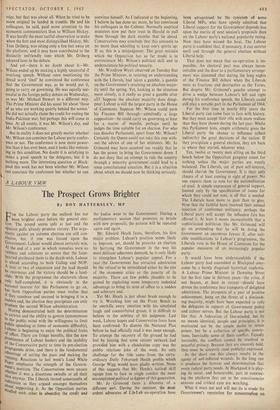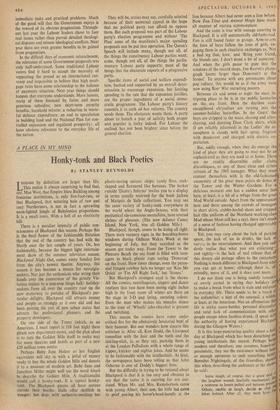A LABOUR VIEW
The Prospect Grows Brighter.
By ROY HATTERSLEY, MP
FOR the Labour party the outlook has not been brighter since before the general elec- tion. The pound seems safe at last and the °Pinion polls already promise victory. The argu- ments against an autumn election are still con- clusive, but, if one was forced upon the Government, Labour would almost certainly win. At the end of a year in which remedies were so ruthless and solutions so severe that the faint- hearted attributed them to the death-wish, Labour Is ahead according to both Gallup and NOP. A Year or two of expansion and the lead should he enormous and the victory should be a land- slide, With the programme the electorate chose Only half-completed, it is obviously in the national' interest for this Parliament to go on, but both Opposition parties must realise that if they combine and succeed in bringing it to a sudden end, the election they precipitate can only Produce the second Wilson administration. Having demonstrated both the determination tc survive and the ability to govern (synonymous pube public mind with the willingness to limit c spending at times of economic difficulty), Labour is beginning to enjoy the political fruits °f Ace. There are fringe benefits, like the new Prominence of Labour leaders and the inability of the Conservative party to time its pre-election I3r0Paganda drive, and there is the fundamental advantage of setting the pace and making the Punning. Reactions to last week's Land White aPer emphasise the strength of the Govern- position. The Conservatives were unsure ''i" ether it was a disastrous swindle or all their des anyway, The Liberals turned somersaults of indecision as they argued amongst themselves about supporting it. As the Opposition parties rivalled each other in absurdity the credit and
the kudos went to the Government, During a parliamentary session that promises to bristle with new proposals, the pattern will be repeated again and again.
Mr. Edward Heath faces, therefore, his first major problem, Labour's position seems likely to improve, yet, should he provoke an election by harrying the Government in the way his most militant adherents demand, he is only likely to strengthen Labour's popular appeal. For a year the Government has attracted admiration by the refusal to be intimidated either by the size of the economic crisis or the paucity of its majority. There are few public plaudits to be gained by exploiting some temporary technical advantage to bring its term of office to a sudden and arbitrary end.
Yet Mr. Heath is just about brash enough to .try it. Watching him on the Front Bench as he overkills every emotion with his simulated laugh and counterfeited groan, it is difficult to believe in the subtlety of his judgment. Last week, Labour hopes and Conservative fears have been confirmed. To dismiss the National Plan before he had officially read it was inept enough. To attempt the recovery of the ground he had lost by hinting that some sinister network had provided him with a clandestine copy was the public relations joke of the week. Its only challenge for the title came from the extra- ordinary Daily Telegraph Heath profile which George Wigg would have gladly written. None of this suggests that Mr. Heath's tactical skill equips him to face in single combat the most accomplished political in-fighter of this generation.
Mr. Jo Grimond faces a dilemma of a different sort. During the summer, the most ardent advocates of Lib-Lab co-operation have
been antagonised by the cynicism of some Liberal MPs, who have openly admitted that
Liberal support for the Government depends less upon the merits of next session's proposals than on the Labour party's national popularity rating.
Now they have missed the boat. The Labour party is confident that, if necessary, it can survive until and through the general election without Liberal help.
That does not mean that co-operation is im- possible. An electoral pact was always incon- ceivable and the door to a parliamentary arrange- ment was slammed shut during the long nights of the Finance Bill debate when the Liberals
were as fractious and destructive as the Tories. But despite Mr. Grimond's gauche attempt to drive a wedge between Labour's left and right during his conference speech, the Liberals could still play a notable part in the Parliament of 1964.-
For the first time in nearly fifty years the Liberal party can come face to face with history. But they must accept their role with more realism than they have shown during the last year. Whilst this Parliament lasts, simple arithmetic gives the Liberal party the chance to influence (albeit indirectly) the great decisions of the nation. If they precipitate a general election, they are back to where they started, whoever wins.
Ten, twelve or twenty men sitting on the third bench below the Opposition gangway count for nothing unless the major parties are evenly balanced. The Liberals, out of pure self-interest, should cherish the Government. It is their only chance of at least coming in sight of power. No one expects them to vote for the nationalisation of-steel. A simple expression of general support, limited only by the specification of issues for which they could not vote, is all that is needed. The Liberals have more to gain than to give. Now that the faithful have received their annual injection of conference militancy, perhaps the Liberal party will accept the influence fate has offered it. At least it seems inconceivable that a sophisticated politician like Mr. Grimond will go on pretending that he will be doing the Government an enormous favour if, after suit- able modifications to Labour's programme, the Liberals vote in the House of Commons for the popular measures of an increasingly popular party.
It would have been understandable if the Labour party had assembled at Blackpool over- come by a barely disguised hysterical euphoria. A Labour Prime Minister in Downing Street for the first time in thirteen years—the crisis, if not beaten, at least in retreat--should have driven the conference into transports of delighted admiration. Thz prospects of a year of positive achievement, hung on the threat of a diminish- ing majority, might have been expected to rally the delegates in support of Government policy and calmer nerves. But the Labour party is not like that. A federation of like-minded, but by no means identical, people and principles, it is motivated not by the simple desire to retain power, but by a collection of specific convic- tions. Inevitably some of them conflict. Equally inevitably the conflicts cannot be resolved in peaceful privacy. Because they are sincerely held, they must be sincerely (and publicly) expressed. In the short run this always results in the agony of self-inflicted wounds. In the long run it produces the fervour and determination that every radical party needs. At Blackpool it is play- ing its usual, and honourable, part in convinc- ing the platform that out in the constituencies anxious and critical eyes are watching.
What it must not and will not do is erode the Government's reputation for concentration on immediate tasks and practical problems. Much of the good will that the Government enjoys is the reward of its obvious pragmatism. Through- out last year the Labour leaders chose to face real issues rather than pursue detailed theologi- cal disputes and minute ideological conflicts. Next year there are even greater benefits to be gained from pragmatism.
In the difficult days of economic retrenchment, the relevance of some Government proposals was only half-understood. Some traditional Labour voters find it hard to accept the necessity of supporting the pound as an international cur- rency and impossible to believe that high mort- gage rates have some relationship to the balance of payments situation. Next year things should happen that everyone understands. More houses, many of them financed by fairer and more generous subsidies; new short-term security benefits; leasehold reform; a reduction in waste- ful defence expenditure; an end to speculation in building land and the National Plan for con- trolled expansion and regulated prosperity: all have obvious relevance to the everyday life of the nation. They will be, critics may say, carefully selected because of their universal appeal in the hope that no political party can afford to oppose them. But each proposal was part of the Labour party's election programme and without 'The Plan' none of the manifesto's major spending proposals can be put into operation. The Queen's Speech will include many, though not all, of the things the constituency Labour parties want; some, though not all, of the things the parlia- mentary Labour party supports; most of the things that the electorate expects of a progressive party.
Specific items of social and welfare expendi- ture, backed and supported by an overall deter- mination to encourage expansion, but limiting spending to the rate that the expansion justifies, are the proper ingredients of a social demo- cratic programme. The Labour party's history commits it to such ad hoc reforms. The country needs them. The electorate wants them. A party about to launch a year of activity both proper and popular is lucky indeed. For Labour the outlook has not been brighter since before the general election.







































 Previous page
Previous page